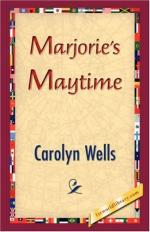“You see,” said Cousin Ethel, “everybody else is arranged for. And unless Marjorie goes with Bertha Baker, the child will have to go alone, for nobody else is willing to go with her.”
“What a disagreeable girl she must be!” said King. “I’m glad I don’t have to go with her.”
“But you will have to, King,” said Marjorie. “He’ll have to push our cart, won’t he, Cousin Ethel?”
“Why, yes, I thought he would do that; but he shan’t if he doesn’t want to.”
“Oh, I do want to,” declared King, agreeably. “I’m not afraid of any grumpy girl. I’ll smile on her so sweetly, she’ll have to smile back.” And King gave such an idiotic grin that they all smiled back at him.
“Now,” went on Cousin Ethel, briskly, “I thought, Marjorie, you could have the doll cart, and Kitty could be with May Perry and help sell the flowers. The flower wagon will be very pretty, and flowers are always easy to sell.”
“So are dolls,” said Marjorie. “Can I help you make some. Cousin Ethel, or are they already made?”
“The more elaborate dolls are being dressed by the ladies of our Club. But I thought, that if your mother and I and you girls could get to work to-day, we could make a lot of funny little dolls that I’m sure would be saleable.”
“Let me help, too,” said Cousin Jack. “I can make lovely dolls out of peanuts.”
“Nonsense,” said his wife, “we can all make peanut dolls. And besides, Jack, you must get away to your business. Your office boy will think you’re lost, strayed, or stolen.”
“I suppose I must,” sighed Cousin Jack; “it’s awful to be a workingman. Come on, Ned; want to go in to Boston with me?”
The two men went away, and after a while Cousin Ethel called the children to come to what she called a Dolly-Bee.
On the table, in the pleasant living room, they found heaps of materials. Bits of silk and lace and ribbon, to dress little dolls,—and all sort of things to make dolls of.
King insisted on helping also, for he said he was just as handy about such things as the girls were. To prove this, he asked Cousin Ethel for a clothespin, and with two or three Japanese paper napkins, and a gay feather to stick in its cap, he cleverly evolved a very jolly little doll, whose features he made with pen and ink on the head of the clothespin.
And then they made dolls of cotton wadding, and dolls of knitting cotton, and peanut dolls, and Brownie dolls, and all sorts of queer and odd dolls which they invented on the spur of the moment.
They made a few paper dolls, but these took a great deal of time, so they didn’t make many. Paper dolls were Kitty’s specialty. But she cut them so carefully, and painted them so daintily, that they were real works of art, and therefore consumed more time than Cousin Ethel was willing to let her spend at the work.
“You mustn’t tire yourselves out doing these,” she admonished them. “I only want you to work at them as long as you enjoy it.”




